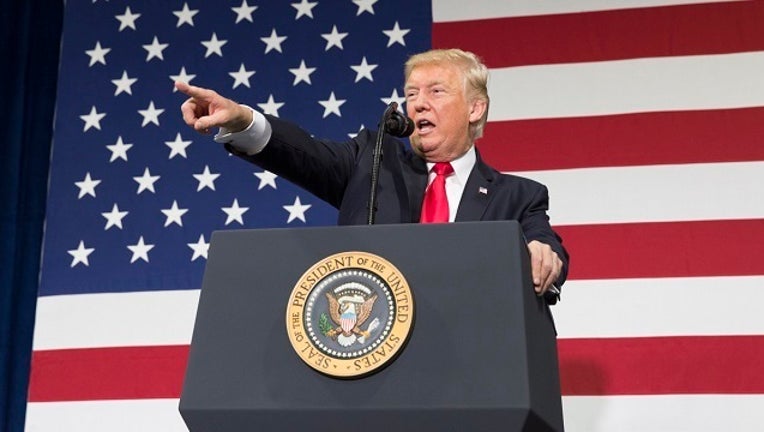Times publisher asks Trump to reconsider anti-media rhetoric

President Donald Trump (Official White House Photo by Joyce N. Boghosian)
BRIDGEWATER, N.J. (AP) -- The publisher of the New York Times said Sunday he "implored" President Donald Trump at a private White House meeting this month to reconsider his broad attacks on journalists, calling the president's anti-press rhetoric "not just divisive but increasingly dangerous."
In a statement, publisher A.G. Sulzberger said he decided to comment publicly after Trump revealed their off-the-record meeting to his more than 53 million Twitter followers on Sunday. Trump's aides had requested that the July 20 meeting not be made public, Sulzberger said.
"Had a very good and interesting meeting at the White House with A.G. Sulzberger, Publisher of the New York Times. Spent much time talking about the vast amounts of Fake News being put out by the media & how that Fake News has morphed into phrase, "Enemy of the People." Sad!" Trump wrote.
Sulzberger, who succeeded his father as publisher on Jan. 1, said his main purpose for accepting the meeting was to "raise concerns about the president's deeply troubling anti-press rhetoric."
"I told the president directly that I thought that his language was not just divisive but increasingly dangerous," he said.
Sulzberger said he told Trump that while the phrase "fake news" is untrue and harmful, "I am far more concerned about his labeling journalists `the enemy of the people.' I warned that this inflammatory language is contributing to a rise in threats against journalists and will lead to violence."
Sulzberger, who attended the meeting with James Bennet, the Times' editorial page editor, said he stressed that leaders outside the U.S. are already using Trump's rhetoric to justify cracking down on journalists.
"I warned that it was putting lives at risk, that it was undermining the democratic ideals of our nation, and that it was eroding one of our country's greatest exports: a commitment to free speech and a free press," the publisher said.
Sulzberger added that he made clear that he was not asking Trump to soften his attacks against the Times if he thinks the newspaper's coverage is unfair. "Instead, I implored him to reconsider his broader attacks on journalism, which I believe are dangerous and harmful to our country," he said.
Trump reads the Times and gives interviews to its reporters. But the president -- who, like all politicians, is concerned about his image -- also regularly derides the newspaper as the "failing New York Times." However, the Times' ownership company in May reported a 3.8 percent increase in first-quarter revenue compared to the same period in 2017.
The president, who lashes out over media coverage of him and the administration that he deems unfair, has broadly labeled the news media the "enemy of the people" and regularly accuses reporters of spreading "fake news" -- the term he often uses for stories he dislikes.
Last week, Trump told hundreds of people attending the annual Veterans of Foreign Wars convention in Kansas City, Missouri: "Don't believe the crap you see from these people, the fake news," as he gestured toward journalists at the back of the room and the crowd erupted.
He also told them to remember "what you're seeing and what you're reading is not what's happening."
Sulzberger said he accepted the meeting because Times publishers have a history of meeting with presidential administrations and other public figures who have concerns with the publication's coverage of them.
After Sulzberger took charge, Trump tweeted that his ascension gave the paper a "last chance" to fulfill its founder's vision of impartiality.
In the tweet, Trump urged the new publisher to "Get impartial journalists of a much higher standard, lose all of your phony and non-existent `sources,' and treat the President of the United States FAIRLY, so that the next time I (and the people) win, you won't have to write an apology to your readers for a job poorly done!"
Trump's tweet about his meeting with Sulzberger highlighted tensions that exist between the administration and the news media.
That issue was put on display last week after the White House told one of CNN's White House reporters she could not attend a Rose Garden event that was open to all credentialed media.
The correspondent, Kaitlan Collins, said she was barred because she asked Trump questions he did not like at a press event in the Oval Office earlier that day. The White House said Collins was barred because she refused to leave the Oval Office after being repeatedly asked to do so. Other journalists who were in the room at the time disputed the White House account.
MORE: White House bars CNN correspondent from open press event
Anthony Scaramucci, who spent 11 days as White House communications director before he was fired over an obscenity-laced tirade against other staffers in an interview, said he disagreed with the decision to put Collins in the "penalty box."
Scaramucci told CNN's "State of the Union" the order likely came from Trump because "he likes to be respected." But Scaramucci, who said after he joined the White House last year that he wanted to improve relations with the media, added: "Having a war declaration or having that level of antagonism with the press does not help the president, does not serve his interests going into the midterms or the re-election."
Vice President Mike Pence, in a separate interview, said the administration believes in freedom of the press.
"But maintaining the decorum that is due at the White House I think is an issue that we'll continue to work for," he said in a taped interview broadcast Sunday on Fox Business Network.

